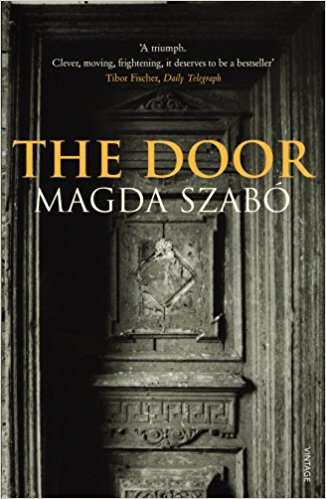Reading this book was a struggle. It took me much longer than I am comfortable to admit. Partially it was caused by many distractions and duties that kept me away from reading and partially because I did not enjoy it.
The Door is not a plot driven book. It is a semi-autobiographical analysis of a one relationship. The narrator is a young woman who moves with her husband to an apartment in Pest. Her husband is sickly and unable to help around the house and she is a writer struggling to write and to get her works published. She has no time or skills required to take care of a household so after a recommendation from a friend she hires an elderly lady named Emerence, who has been a caretaker for tenants in the building for last eternity.
What follows is a recollection of the relationship these two women had, heavy with foreshadowings, flash-backs and a pinch of magical realism. Honestly, I can easily imagine this book being talked over at the university courses or quoted by John Green’s velvety voice in a CrashCourse Literature video. The bitter sweet-friendship between the caretaker and the narrator and the private life of Emerence, kept in secret by the old woman, are supposed to fuel reader’s curiosity and push the story forward. This is exactly where it fails.
I hated both character. For long time I have believed that unlikeable characters do not make book bad, as I have seen many of my friends sharing this belief. Unfortunately The Door revolves solely around two of the most infuriating characters I have had a questionable pleasure of reading about. The narrator is a whiny and pathetic. She always complains about how tired she is, yet she is rarely presented doing anything other than that. Her hyper emotional nature throws her around from one tantrum to another. The author attempts to make her eloquent and enlightened by all the remarks and references to literature and ancient history that she makes, but she comes out as pretentious instead.
Emerence on the other hand simply put is one old mean lady. Her past partially redeems her, as she did not live a quiet and simple life, yet despite that she is such an ass. Emerence is introduced to us as a pillar of local community and she is much help to the narrator, but if I were her, I would fire Emerence in an instant. She is mean, disrespectful and invasive. The enitre idea of the friendship of these two women is beyond me. They do not respect each other,; the concept of these two sharing a family-like loving bond is more than a stretch. Let me show you. This is how a typical interaction between these to looks like:
- The narrator is happy.
- The narrator meets Emerence who says something mean.
- The narrator is upset with Emerence and herself.
- The narrator has an epiphany concerning why Emerence acted the way she did.
- The narrator goes to confront Emerence.
- Emerence has it her way.
- Emrence is smug about having everything end her way.
This scenario repeats over and over and over.
Everything becomes little bit interesting at the end, yet is it overshadowed by the offensive inability of the narrator to make a smart decision.
Somewhere within this book there is the metaphorical door. Behind it, there lies something touching about human nature and how we lock ourselves away from other. At least I think so. Emerence and the narrator did not allow me to open this door and I did not care anymore to argue with them.
VERDICT
Two out of five mean old people.



Leave a comment